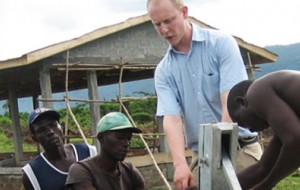WATSAN Phase II
Sierra Leone is a post-conflict country in Western Africa of roughly 72,000 square kilometres and 6 million inhabitants. Since the end of the 11-year civil war in 2002, international partners have supported Sierra Leone in rebuilding itself. Much work in terms of reconstruction and rehabilitation has been done, and strong focus remains on the reestablishment of public service delivery and reforming and strengthening the governance systems.
This project addresses the need for clean water as a human right. Through establishing access to safe water and capacity building in basic sanitation and hygiene, the living conditions in 21 communities significantly improve. Mobilising and organising civil society creates awareness of rights, and increases advocacy towards duty-bearers. The project establishes coordination among duty-bearers and stakeholder at a district level, and creates a space for participatory decision making.
The 2014 Ebola outbreak affected the implementation of the project's awareness raising, but with donor approval, parts of the funds for the project could be reallocated towards fighting the epidemic. Awareness raising of basic sanitation and hygiene became more relevant than ever, and through local partner EWB-SL, the project enabled organisation and capacity building at community level, focusing strongly on health and sanitation.
This project secures access to water at community level, in 21 villages in the Kenema district. These include Nyandeyama, Ngiewamie, Malehun, Tijobu, Bandama, Soweima, Yabaima, Lowoma, Ngelehun, Saguehun, Guworbu, Samie Sendema, Komende, Ggbandoma, Levuma, Wailima, Gangama, Majihun, Wonde, Niahun Bavuhun and Talia. The project also establishes water committees in the villages, who will be responsible for the management, operation and maintenance of the water supply systems. Establishing access to clean water and raising awareness of basic hygiene significantly improves health and living conditions in the 21 communities.
The project contributes to clean water and sanitation in compliance with the current UN Sustainable Development Goals.
Specifications
- Project No.: 056
- Categories: West Africa, Sierra Leone
- Budget: 1.983.190 DKK
- Project Manager: Bauke van Weringh
- Partner Organization: EWB-SL - Engineers without Borders Sierra Leone
